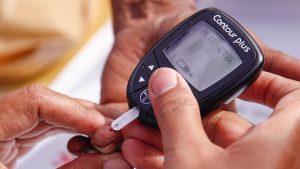
You might have heard about a serious lifestyle disease called type II diabetes, and you might know that it’s bad, but you may not know why it’s bad, and that the key to beating this chronic condition is to know why it happens, how it develops, and that you hold the power to control it.
Type II diabetes can lead to serious complications including:
-
-
- amputation
- cardiovascular disease
- kidney failure
- ulcers
- eye and vision damage
- increased risk of death.
Unfortunately with all the bad side effects you may wish to die faster if you get diabetes.
Diabetes occurs when your cells become insulin resistant leaving insulin and blood sugar levels too high. While you can have a genetic predisposition, you can also eat your way into type II diabetes.
Blood sugar, also known as glucose, comes primarily from the food you eat and is the body’s primary source of energy.
Insulin, a hormone made in the pancreas, helps glucose to get into your cells to be used for energy. With type II diabetes, the body is no longer responding to insulin, or becomes insulin resistant, leaving too much glucose in the blood, and not enough can get into the cells. This raises inflammatory markers like hemoglobin A-1c and is how chronic high fasting blood glucose, or type II diabetes develops.
Prediabetes is where cells are starting to become insulin resistant causing fasting blood sugar levels to be higher than normal, but not high enough yet to be diagnosed as type II diabetes.
The CDC reports that approximately 88 million American adults — nearly half — have pre-diabetes.
Of those adults with prediabetes, it’s estimated that more than 80% don’t even know they have it.(1)
It is possible to have pre-diabetes for years with symptoms like fatigue and weight gain, so it often goes undetected until more serious health complications begin to appear with the development of type II diabetes.
The two biggest factors of type II diabetes are genetics and lifestyle. If your body is not responding to insulin the way it should, a combination of these factors could be causing insulin resistance which leads to type II diabetes. Insulin resistance has the greatest risk of developing into type II diabetes.
It is important to note that although diabetes can be hereditary, that doesn’t necessarily mean that you will develop the disease. Instead, it means that you simply have a greater risk of developing it, but this can be easily avoided.
Lifestyle choices have been shown to have a significant impact on type II diabetes, and pre-diabetes cases.
According to evidence based medicine and nutrition research; in well controlled clinical trials, therapeutic lifestyle changes have been shown to be more effective than drugs in the prevention of type II diabetes in high-risk groups.(2)
For example, a patient may have a genetic mutation that makes them vulnerable to type II diabetes. However, if the patient makes appropriate lifestyle choices like eating healthy, exercising regularly and reducing their stress, they are much more likely to avoid developing the disease at all.
This is why lifestyle choices are absolutely crucial to your well-being and can ultimately save your life.
The first thing you can do to help is always have less than 40 grams of carbs at one time. This will help prevent the repeated blood glucose and following insulin spike that lead to type II diabetes.
The right balance of other nutrients, exercise and stress relief through therapeutic lifestyle changes helps and is necessary if you have pre-diabetes or type II diabetes and want to reverse it.
Bliss Lifestyle Therapies proudly specializes in the most effective
therapeutic lifestyle change programs available.

